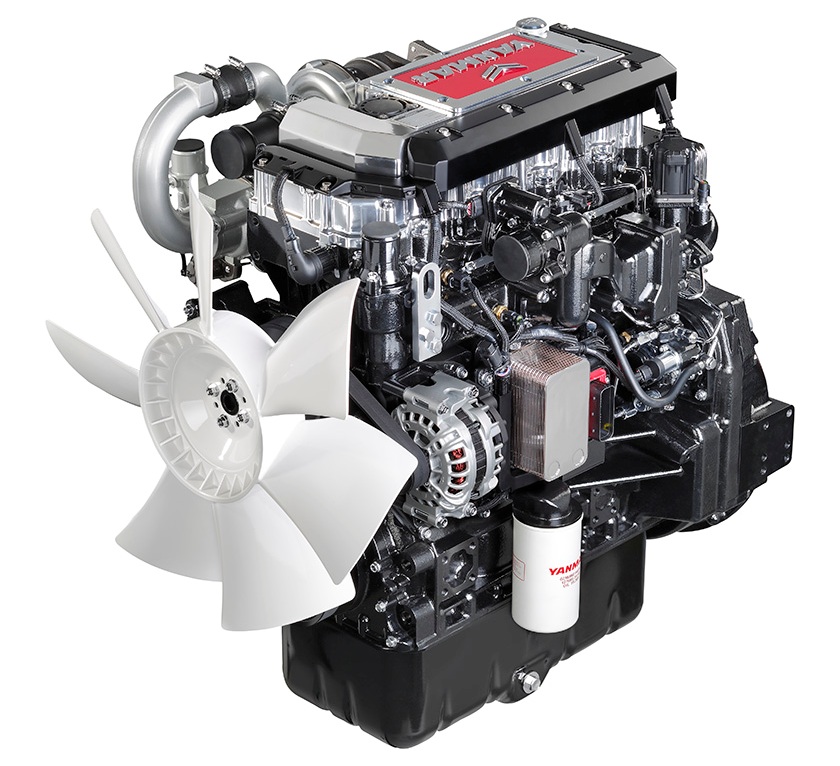As a manufacturer of diesel engines for over 109 years, Yanmar understands the intricacies of engine technology and how to adapt it for various applications. Normally, new engines from Yanmar are tested in the factory for 50 hours before they’re delivered to customers. This helps detect even the smallest manufacturing defects in order to ensure their durability. As a result, Yanmar engines are the most reliable in their categories; it’s common to see Yanmar engines running smoothly for over 40 years on boats as their ownership is passed down from one generation to another.
In the UAE, Al-Futtaim Auto & Machinery Co. (FAMCO) has been the exclusive authorized partner of Yanmar marine engines for over 50 years, supplying diesel engines for commercial and pleasure vessels. Yanmar’s high-performance engines are designed for maximum life and are tested under extreme conditions.

Ramez Hamdan, managing director-industrial equipment (Al-Futtaim Motors, FAMCO, HINO and Toyota Material Handling), says: “At FAMCO, we offer an integrated service that includes design of propulsion and power systems. What sets Yanmar marine engines apart from other brands is that they are purpose-built for marine applications and not ‘marinised’, which means engines developed for other vehicles such as trucks are modified for marine applications.”

Ramez Hamdan, managing director-industrial equipment (Al-Futtaim Motors, FAMCO, HINO and Toyota Material Handling).
Samer Al Junaidi, divisional manager-CE, marine, power and industrial products, FAMCO, adds: “We offer turnkey solutions for propulsion systems including the engine, gearbox, steering system and propellers. In effect, we convert an empty hull into a finished vehicle that is ready to be powered on. For small boats up to 18m, we install the systems at our Dubai workshop; for larger vessels, we install them at shipyards. Yanmar engines and spare parts can be ordered online. The lead time for engines ranges from 4 to 6 months. However, we maintain our own stock to cater to regular on-going projects.”
Commercial vessels, offshore vessels, cargo vessels and fishing boats comprise FAMCO’s largest markets for marine engines, followed by pleasure boats. FAMCO facilitates procurement, maintenance and servicing of engines through its main office, workshop and warehouse in Dubai and additional warehouses for spare parts in Abu Dhabi and Ras Al Khaimah.
Ahmed Gamal Morsy, national sales and aftersales manager, marine solutions, power and industrial product division, FAMCO, points out the common causes of marine engine failure: they include overloading, fuel shortage/contamination, low oil pressure, cooling system failure, misalignment between the engine, gearbox and propulsion system which causes vibrations resulting in the breakage of engine components, and poor design of the exhaust systems, among several other factors. Such incidents can be avoided, especially at sea, with the right selection of engines and design of propulsion systems.
“On average, engines run for about 14,000 to 16,000 hours before an overhaul. Commercial vessels have their own engineering teams on board to handle routine maintenance. Pleasure boat owners tend to use our services especially when the engine is under warranty and even beyond that period because they prefer to deal with an authorised and trusted supplier like FAMCO. Our experts provide guidance on when to rebuild, repower or replace and engine. Sometimes, it’s worthwhile to replace a damaged engine if the repair cost is close to the price of a new engine. However, if the customer cannot afford a long downtime, then the better option would be to overhaul the engine by replacing parts instead of installing a new engine,” says Ahmed.
“With predictive maintenance, for example, we can plan for an overhaul after 14,000 hours with availability of parts. With corrective maintenance, we monitor the engine and take corrective action only after we detect a fault or to compensate for wear and tear. Failure maintenance comes into play after failure of the engine. Of course, we recommend predictive and routine maintenance to maximise the lifespan of the engine,” he adds.
In addition to performance and build quality, low fuel consumption and low emissions are among the defining characteristics of Yanmar engines. In general, when NOx emissions are reduced, the fuel consumption and smoke generation increase. As a solution to this, Yanmar developed its patented ‘ASSIGN’ Combustion System (Available Space Scattering Injection Geometric Nexus), which improves the fuel consumption and smoke generation while reducing NOx emissions. Yanmar marine diesel engines also comply with IMO Tier II emission requirements for the Middle East.
“Being a premium brand, Yanmar still offers a competitive pricing structure. Yanmar engines are primarily mechanical engines which allow any technician to maintain or repair the engines, compared to electronic engines that require a dedicated staff or authorised technicians. This is crucial if servicing or repair is required at sea. We also provide mechanical engines with electronic controls for a more user-friendly operation,” says Ahmed.




